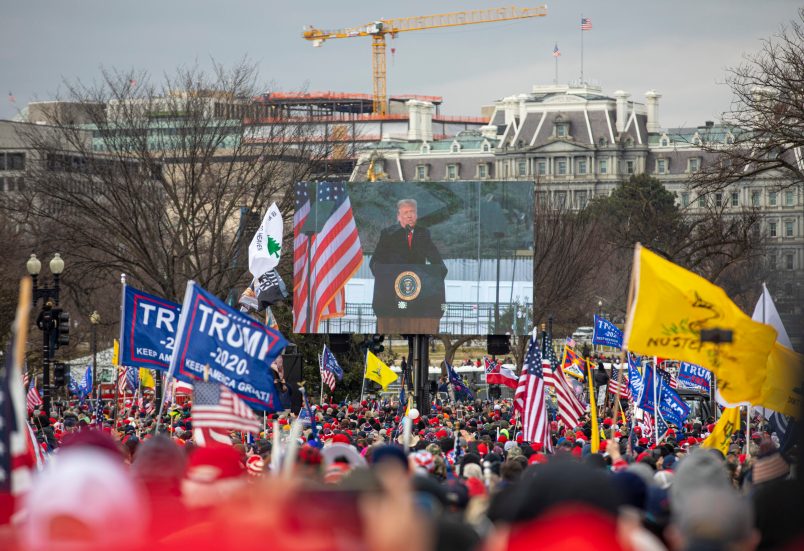Civil cases brought against former President Trump over the Capitol insurrection are testing a startling point: that Trump’s actions on Jan. 6 may fall under presidential immunity.
That immunity is specific to civil liability — not criminal, or political for that matter.
But a recent hearing in the three cases — brought by Capitol police officers and members of Congress over the Jan. 6 attack — explored the issues at length, with U.S. District Judge Amit Mehta for the District of Columbia repeatedly saying that he found the case extremely hard to decide.
Reps. Bennie Thompson (D-MS) and Eric Swalwell (D-CA) brought two of the suits, with Capitol Police officers bringing a third.
The suits accuse Trump of orchestrating a conspiracy to prevent members of Congress from certifying Biden’s Electoral College victory on Jan. 6.
The cases are brought under the Ku Klux Klan Act, a Reconstruction-era law that was also recently used in a trial held in Charlottesville, brought against the organizers of the August 2017 Unite the Right rally. In that case, a jury found organizers liable for damages caused due to the event — a victory for the civil rights groups that brought the case.
“It is a way of holding organizers of certain kinds of rallies liable,” said Rich Schragger, a professor at UVA Law who monitored the trial.
By some readings, the law seems to speak directly to what happened on Jan. 6. It imposes civil (not criminal) liability on people who interfere with the actions of federal officials.
“They were trying to get at folks interfering with federal officials during Reconstruction,” Schragger told TPM of the law’s origins.
“So you’ve got a statue that says both, if you engage in a conspiracy to interfere with the duties of a federal officer, and you’re in a position to prevent it, you could be held liable,” he added.
Seems relevant, right? After all, Mehta himself alluded to the Charlottesville case during last week’s hearing.
But the Jan. 6 example presents different issues that may kill off the case.
The case has run into defenses from Trump’s legal team, mainly on two grounds: that Trump’s speech on Jan. 6 was protected by the First Amendment, and that it was also protected by his status as president.
Legal experts TPM spoke with said that the case raises genuinely thorny issues around presidential immunity, mainly over the question of whether Trump spoke on the Ellipse as part of his official duties as President. And, if so, whether his conduct on the Ellipse could be so egregious as to make him susceptible to some kind of civil liability.
Like many of the Trump court disputes, the relevant precedent comes from the Nixon era, in this case Nixon v. Fitzgerald, which held that presidents receive immunity for actions taken while in office so long as they are within the “outer perimeter” of their duties.
It gives broad discretion to sitting presidents — and it’s that discretion which Jesse Binnall, a lawyer for Trump, cited at the hearing.
But the question that lawyers for members of Congress raised is: can you separate Trump the president from Trump the politician? That is, was Trump addressing the crowd in his capacity as President of the United States, for which he receives broad immunity? Or in his capacity as a Republican politician, meaning that only First Amendment-based protected speech arguments should apply, and not presidential immunity.
Alan Rozenshtein, a professor at the University of Minnesota Law School and former attorney advisor in the National Security Division of the U.S. Department of Justice under President Obama, argued to TPM that Trump likely fell within the “outer perimeter” of his officials duties — in this case, addressing the public.
“What’s tricky about Jan. 6 is that Trump is alleging a massive conspiracy and fraud on the American public — he is saying that the Constitution is under attack by crooked Dems or RINO Republicans, and we have to take back our country,” Rozenshtein said. “It’s a lie, but to me it’s campaign rhetoric; that’s him going to the American people, and it’s what we’d want him to do if the Constitution really were under attack.”
This is another place it gets tricky. How much should the court weigh that Trump is acting in bad faith?
It’s not clear. Mehta could carve out an exception for Trump, or leave it be, asserting that while Trump is an edge case, the law should err on the side of protecting presidential speech.
“If there is one thing this hearing has shown, it’s that this is not an easy case,” Mehta remarked during the five-hour hearing.







That’s funny. Everyone else is saying Mehta was very skeptical about complete civil immunity.
Would be nice if this article would list some of his questions, and the ridiculous TFG-lawyer answers.
Add to this the fact that TFG is being sued for acts he committed as CANDIDATE Trump, not president.
If our legal system allows for a President (republican) to engage in the incitement to violence and allows a President (republican) to overthrow the results of a legal and certified election we are well and truly screwed.
All persons, even republican presidents, are accountable to the rule of law or we are just another corrupt dictatorship.
Who was his audience?
That, in and of itself, defines the event as a campaign function.
There was no national presidential address; no attempt to call upon legitimate non-partisan experts. All the speakers were political allies immersed in a conspiracy to defraud the United States.
This is a no brainer. Seriously. Presidents are NOT kings.
Google search for “judge mehta immunity” yields these results on the first page:
So with that theory, a president could yell fire in a crowded theater and claim freedom of speech and addressing the public within his duties. Isn’t that in effect what he did on the Elipse?